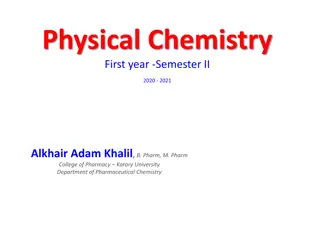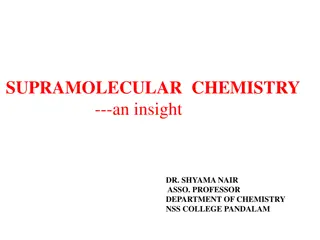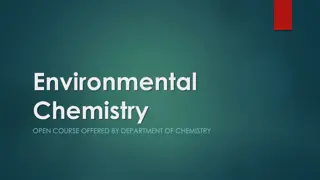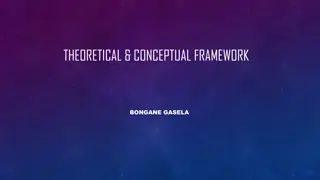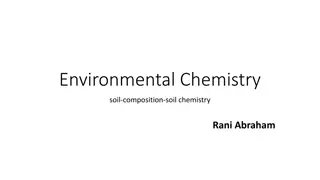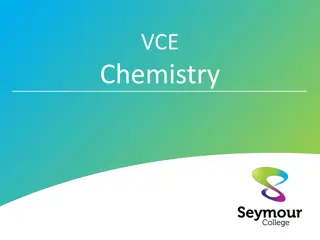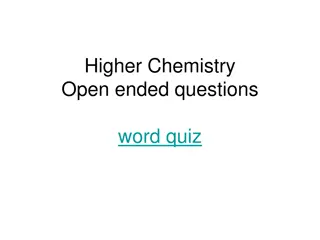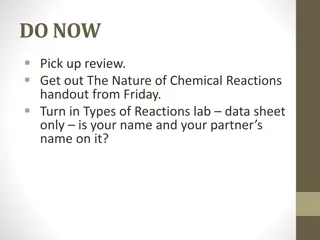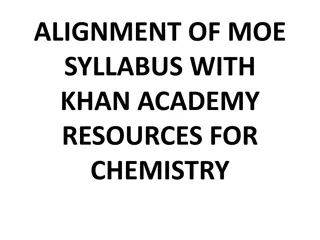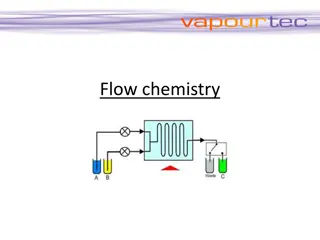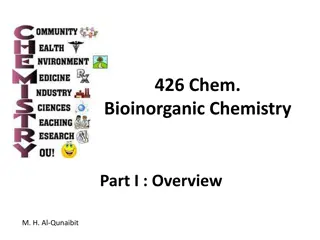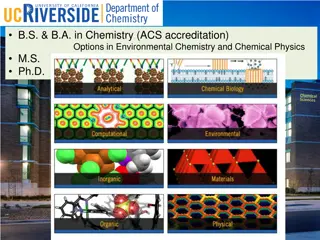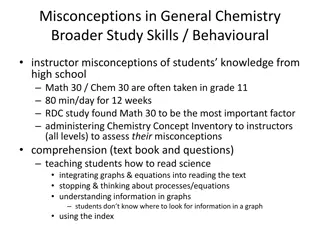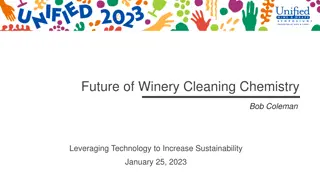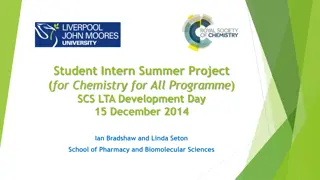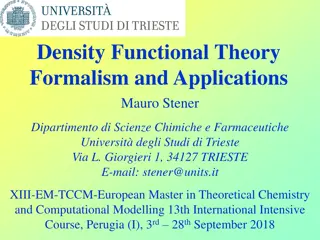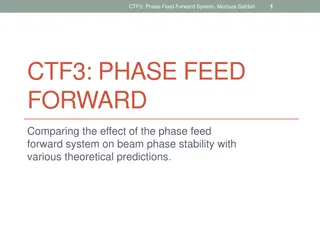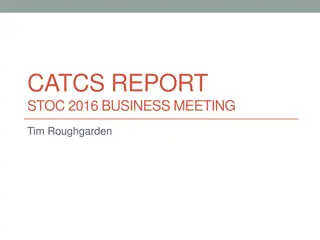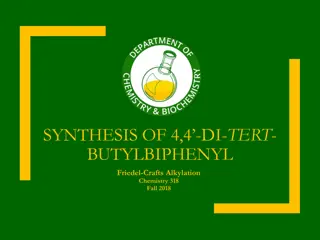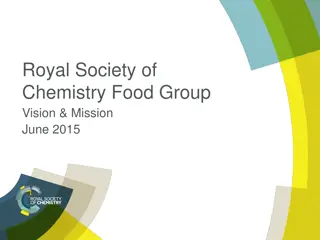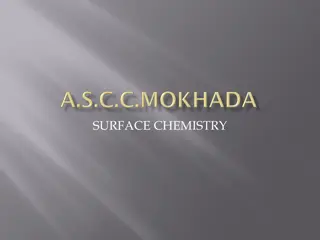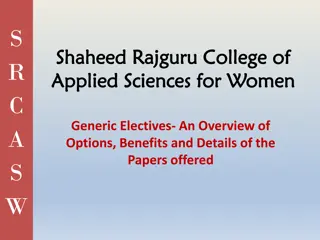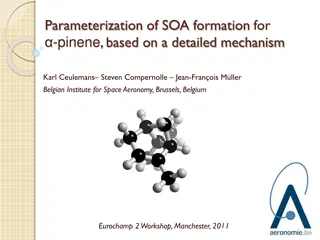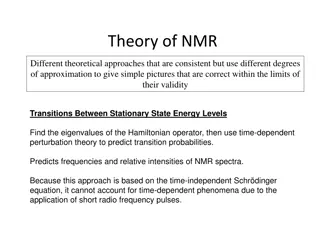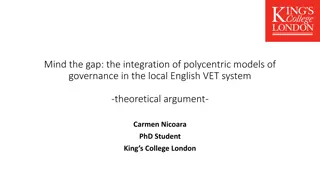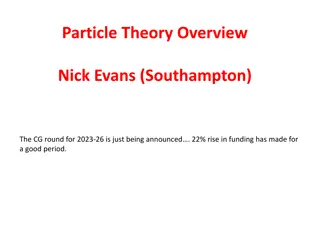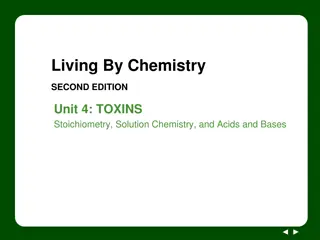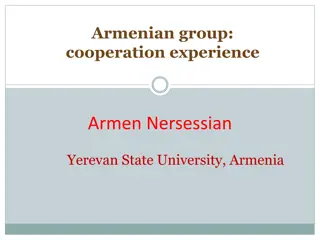Organometallic Chemistry (CHEM 42 1)
Organometallic chemistry delves into compounds with carbon-metal bonds, merging concepts from inorganic and organic chemistry. The field encompasses diverse compounds like ferrocene and tris(triphenylphosphine)rhodium carbonyl hydride, with nomenclature based on naming organic groups and adding meta
1 views • 13 slides
Green Chemistry and the Power of AI: Transforming Industries
Explore the principles and practices of green chemistry, focusing on safe and sustainable chemical processes that prioritize environmental impact. Learn how artificial intelligence is revolutionizing industries by enhancing efficiency, accuracy, and customer experiences. Discover the synergy between
4 views • 10 slides
Introduction to Chemistry: Matter, Energy, and Measurement
Chemistry is the study of matter, its properties, and the changes it undergoes. This content covers the basics of chemistry, including the classification of matter into pure substances and mixtures, different states of matter, and the building blocks of matter such as atoms and molecules. Sample exe
5 views • 51 slides
Introduction to Co-ordination Chemistry: Fundamentals and Applications
Explore the fascinating field of coordination chemistry, delving into the complexity of compounds and the coordination bonds that govern their structures. Discover the history, key concepts, and applications of coordination chemistry through a detailed examination of coordination compounds, bonding
13 views • 73 slides
Insights into Theoretical English Grammar
The theoretical English grammar delves into the subject matter of grammar, including systemic conceptions, grammatical forms, categories, paradigms, and morphological means. It discusses the constituent parts of language – phonology, lexicology, and grammar. The grammatical structure covers morpho
7 views • 26 slides
Organometallic Compounds of Group 2 Elements
In the realm of organometallic chemistry, Group 2 elements, specifically alkaline earth metals like beryllium and magnesium, exhibit intriguing properties and reactivities. The chemistry of these elements, mimicking that of Group 12 elements in many aspects, leads to the formation of various organom
5 views • 27 slides
Understanding the Diels-Alder Reaction in Practical Organic Chemistry
The Diels-Alder reaction is a fundamental method in organic chemistry for producing cyclic organic compounds by combining a conjugated diene with an alkene. This reaction, named after Otto Diels and Kurt Alder, involves the formation of a six-membered ring with specific bond rearrangements. Conjugat
4 views • 15 slides
Fuel Your Success Conquer the IB Chemistry (SL and HL) Examination
Ignite your potential and achieve excellence in the IB Chemistry (SL and HL) Examination with our comprehensive study resources. Access practice exams, study guides, and expert guidance to excel in your test. Start your journey towards academic success today!\nClick Here to Get IB-Chemistry Dumps Wi
4 views • 6 slides
Role of Chemistry in Pharmaceutical Sciences
Medicines and drugs used for treating diseases are organic or inorganic chemicals. Studying drug chemistry is essential for pharmacists. This course covers fundamentals of chemistry, states of matter, radiochemistry, thermodynamics, kinetics, and chemical equilibria. Important subtopics include atom
2 views • 35 slides
Exploring Supramolecular Chemistry: Insights and Applications
Supramolecular chemistry delves into the chemistry of molecular assemblies, intermolecular bonds, and non-covalent interactions, leading to the formation of supra-molecules through aggregation of molecular subunits. Concepts like molecular recognition, self-organization, and host-guest chemistry pla
0 views • 18 slides
Environmental Chemistry Open Course: Understanding Pollution and Control Measures
Dive into the world of environmental chemistry with this comprehensive open course offered by the Department of Chemistry. Explore the causes, effects, and control measures of air, water, soil, noise, thermal, light, and radioactive pollutions. Gain insights into pollution terminology, water quality
3 views • 9 slides
Understanding Theoretical and Conceptual Frameworks in Research
The theoretical and conceptual frameworks in research play vital roles by grounding studies in theoretical constructs, enhancing rigor and empiricism, and guiding the research process. The theoretical framework provides a blueprint based on existing theories, guiding researchers in developing their
0 views • 12 slides
Understanding Soil Chemistry and Redox Reactions in Environmental Chemistry
Soil chemistry plays a crucial role in sustaining healthy soils by influencing nutrient availability through oxidation and reduction processes. Redox reactions in soil are impacted by factors like oxygen content and water presence, affecting nutrient supplies. The redox status of soil reflects its n
1 views • 92 slides
Explore Chemistry with Seymour College - VCE Chemistry Course Overview
Dive into the world of chemistry with Seymour College's VCE Chemistry course. Discover the nature of matter, chemical reactions, design innovation, and carbon compounds. Explore diverse pathways in environmental technology, academia, health sciences, and more. Prepare for a challenging yet rewarding
0 views • 5 slides
Understanding Probability: Experimental and Theoretical Concepts
Probability is the measure of the likelihood of an event happening, with experimental and theoretical probability being key concepts. Experimental probability involves determining probabilities through experience or experiments, while theoretical probability can be calculated without prior experienc
2 views • 23 slides
Understanding Chemistry through Open-Ended Questions
The content provides a detailed assessment of student responses to open-ended chemistry questions related to hydrogen peroxide and its applications in teeth whitening gels. Various student answers are analyzed based on their understanding of the chemistry concepts involved, with explanations given f
1 views • 18 slides
Understanding Chemical Reactions in Chemistry Lab
Explore the fascinating world of chemical reactions in the chemistry lab through hands-on experiments and theoretical knowledge. Learn to identify reactants and products, understand the characteristics of chemical reactions, use appropriate symbols in equations, and balance chemical equations effect
2 views • 22 slides
Comprehensive Alignment of MOE Chemistry Syllabus with Khan Academy Resources
This comprehensive alignment showcases the correlation between the Ministry of Education (MOE) chemistry syllabus and the educational resources provided by Khan Academy. It covers various topics in chemistry such as the particulate nature of matter, atomic structure, chemical bonding, stoichiometry,
1 views • 9 slides
Understanding Flow Chemistry for Efficient Chemical Reactions
Flow chemistry, also known as continuous flow or plug flow chemistry, revolutionizes chemical reactions by running them in a continuous flow stream. This dynamic process offers efficient manufacturing of chemical products with precise control over critical parameters like stoichiometry, mixing, temp
2 views • 7 slides
Exploring Bioinorganic Chemistry: Connecting Inorganic and Biochemistry
Bioinorganic Chemistry bridges the gap between inorganic chemistry and biochemistry, understanding the vital role of inorganic elements in living systems. This interdisciplinary field delves into the structure, function, and exploitation of metal ions in biological processes, emphasizing their inter
0 views • 47 slides
UC Riverside Chemistry Program: Excellence in Education and Research
UC Riverside's Chemistry Program offers a range of options in ACS-accredited Chemistry education, with highlights including a distinguished faculty, substantial research funding, and high rankings. The program also boasts a Nobel Prize-winning faculty member and a comprehensive curriculum that cover
0 views • 5 slides
Overcoming Misconceptions in Chemistry Education
Addressing misconceptions in general chemistry education, focusing on student knowledge from high school Math and Chemistry courses. Emphasis on student motivation, learning strategies, and common misconceptions in understanding scientific concepts. Strategies for enhancing comprehension, applicatio
0 views • 12 slides
Innovations in Winery Cleaning Chemistry for Sustainability
Explore the future of winery cleaning chemistry through leveraging technology and sustainable practices. Considerations for chemistry selection focusing on safety, hazardous materials, employee well-being, and environmental impact are highlighted. Current cleaning chemistry practices, including the
0 views • 19 slides
Overview of LJMU Chemistry for All Programme Summer Internship Project
LJMU's Chemistry for All Programme aims to enhance student experiences through summer internships, curriculum development, and outreach activities. The project, funded by the Royal Society of Chemistry, involves a cross-university collaboration to engage local schools and foster interest in chemistr
0 views • 21 slides
Understanding Density Functional Theory in Computational Chemistry
Dive into the formalism and applications of Density Functional Theory (DFT) through a comprehensive review of basic theory, equations, and numerical implementations. Explore concepts like Time-Dependent DFT (TDDFT) and Linear Response formalism, and discover its applications in studying plasmons, co
0 views • 26 slides
Phase Feed Forward System: Analyzing Beam Phase Stability and Theoretical Predictions
Exploring the impact of phase feed forward systems on beam phase stability through comparisons with theoretical predictions and simulations of increasing limitations. Testing the accuracy of theoretical gain factors and assessing performance using global gain factors. Utilizing specific data files a
0 views • 58 slides
Committee for the Advancement of Theoretical Computer Science (CATCS) - Overview and Initiatives
CATCS, the Committee for the Advancement of Theoretical Computer Science, plays a crucial role in connecting the TCS community with funding agencies and other research communities. Through various efforts like recruiting, serving on panels, and enhancing TCS entries on Wikipedia, CATCS aims to promo
0 views • 10 slides
Organic Chemistry Synthesis Lab Overview for Fall 2018
The post provides detailed information on the synthesis of 4,4-di-tert-butylbiphenyl through Friedel-Crafts Alkylation in Chemistry 318 for the Fall 2018 semester. It includes a schedule of the lab day, due dates for reports and assignments, grading criteria, pre-lab requirements, and emphasis on si
1 views • 15 slides
Theoretical Calculations of Beta-Delayed Neutrons and Sensitivity Analyses
In this talk by Futoshi Minato from JAEA Nuclear Data Center, topics covered include delayed neutron emission probabilities, incident neutron energy dependence, sensitivity analysis with JENDL evaluated libraries, and important precursors in r-process nucleosynthesis. Theoretical calculations are pr
0 views • 27 slides
Royal Society of Chemistry Food Group Vision & Mission Summary
The Royal Society of Chemistry Food Group aims to lead, promote, and disseminate the understanding and importance of chemistry in food. Their vision is to enhance food and nutrition security through advancing the chemistry of food ingredients. They strive to engage with various communities to promot
0 views • 4 slides
Understanding Surface Chemistry and Adsorption Phenomena
Surface chemistry is a crucial branch of chemistry that focuses on the chemical processes occurring at interfaces between different surfaces like solid-liquid, solid-gas, and liquid-gas. This field plays a significant role in various industries, including electronics. Adsorption, absorption, and sor
0 views • 15 slides
Chemistry 1151K Course Overview and Chapters Summary
Upon completion of the CHEM 1151K course, students will apply the scientific method to investigate chemical questions in allied health, utilize dimensional analysis to solve quantitative problems, communicate effectively using chemical terminology and symbols, describe the behavior of biochemical so
0 views • 44 slides
Biochemistry and Chemistry Elective Courses Overview at SRCASW
The Shaheed Rajguru College of Applied Sciences for Women offers elective courses in Biochemistry and Chemistry. The Biochemistry course covers biomolecules like amino acids, proteins, carbohydrates, lipids, and nucleic acids, emphasizing their properties and functions. It also includes practical ex
0 views • 19 slides
Understanding SOA Formation for α-Pinene Using Detailed Mechanisms
This content discusses the parameterization of secondary organic aerosol (SOA) formation for α-pinene based on a detailed mechanism, outlining the BOREAM model for simulations, incorporating explicit and generic chemistry. Various experiments and simulations in smog chambers are analyzed, revealing
0 views • 21 slides
Insights into Theoretical Approaches in NMR Spectroscopy
Theoretical approaches in NMR spectroscopy encompass diverse methods, each with varying degrees of approximation but yielding correct results within their validity. Techniques such as transition probabilities using the time-dependent perturbation theory, Zeeman interaction for energy level transitio
0 views • 32 slides
Integration of Polycentric Models in English VET System: Theoretical Framework
The theoretical argument explores the free-riding problem in training, proposing a polycentric model of governance to address it. It discusses the role of Local Enterprise Partnerships (LEPs) in overcoming this challenge. Additionally, an apprenticeship theoretical framework and the concept of train
0 views • 10 slides
Particle Theory Overview: Funding Rise and Academic Quality Boost in UK Theoretical Physics
The recent announcement of a 22% rise in funding for UK theoretical physics marks a positive period for the field. The PPGP(T) Panel chaired by Nick Evans of Southampton has seen a growth in academic numbers, quality, and leadership since 2019. Phenomenology plays a crucial role in guiding search st
0 views • 19 slides
Understanding Molar Mass and Conversions in Chemistry
Explore the concept of molar mass, moles of atoms, and conversions between mass and moles in chemistry through an engaging lesson on toxins, stoichiometry, solution chemistry, and acids and bases. Learn how to calculate molar mass, describe the magnitude of a mole of a substance, and conduct simple
0 views • 10 slides
Understanding Probability: Learning Outcomes and Examples
This content delves into the study of probability, covering topics such as representing probabilities of simple and compound events, calculating relative frequencies, multi-step chance experiments, theoretical and experimental probabilities. It explains concepts like chance experiments, sample space
0 views • 31 slides
Challenges Faced by Theoretical Physics in Armenia
The field of theoretical physics in Armenia has faced challenges such as a decline in the number of active theorists, an imbalance in age distribution, and a loss of internal collaborations leading to integration with Western groups. This has resulted in the need for young talents to pursue opportun
0 views • 21 slides








